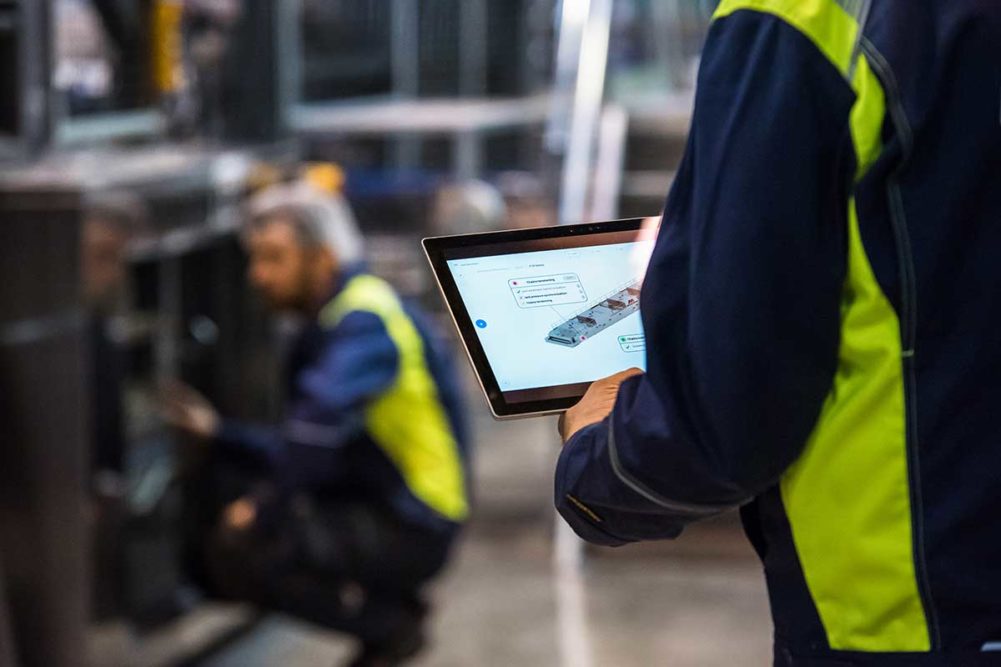When incorporating more digital tools, getting the production room team involved is integral to making the most of data collection and analysis. However, understanding and interpreting the data requires its own kind of training.
“As with any new technology, there is always a learning curve,” said Adam Signoretta, engineering manager, Stewart Systems, a Middleby Bakery brand. “With this technology, there are new parameters introduced to the HMI that can be adjusted and modified as needed to ensure products and pans are not being rejected when they meet the requirements.”
To assist with training employees to use digital tools well, Stewart Systems updates its manuals as new technology is added, Mr. Signoretta pointed out.
“We are constantly revamping our manuals to include all pertinent information, training and troubleshooting of the system,” he said.
In the field, service technicians train operators onsite and provide documentation to ensure the operators understand the new technology fully. The grade of the learning curve, however, depends on the complexity of the digital tools.
“The learning curve can vary depending on the complexity of the tools and the experience level of the operators,” explained Ryan Costello, director of engineering, Gemini Bakery Equipment/KB Systems. “For simpler tools, such as automated mixing, operators may only require minimal training. They may need to learn how to load ingredients, adjust settings and monitor the process, but these tasks are typically straightforward and can be learned relatively quickly. On the other hand, more advanced tools, such as control systems or data analysis software, may require more extensive training.”
This includes training operators on how to interpret data, identify trends and adjust the production line based on that information. Without this knowledge, the data’s usefulness ends with the operator. Gemini Bakery Equipment trains operators how to use the data to run equipment efficiently and optimize production during equipment install.
“We support on-site training for our customers to get hands-on experience with the tools,” Mr. Costello said. “Gemini can also provide online training resources, such as instructional videos and manuals, to help operators learn at their own pace in addition to the in-person support. We pride ourselves on the ability of our technical support services to answer any questions or concerns that operators may have.”
John McIsaac, vice president of business development, Reiser, noted that for those tools used by “on the floor” operators, clear messaging and instruction on HMI panels go a long way to ensuring operators follow through on what the data is directing. More complex tools for mechanics and technicians are password protected.
Mecatherm also supports operators during system install to learn both its M-Plan solution and M-Care support. The M-Plan’s 3D model of the production line has the added benefit of helping operators better understand the production line through its simulations. The M-Care digital solution is designed to be intuitive and user-friendly. It guides operators and maintenance teams through the first level of checks they need to complete each time a drift occurs.
One of the greatest threats to not optimizing a bakery’s use of data, Mr. Ciminelli pointed out, is simply a lack of awareness.
“Optimizing the operational and management value of the information typically requires a top-of-mind awareness of what is being collected and timely reviews,” he said.
By implementing those timely reviews and having a staff trained to respond to data collected, operations can unlock production efficiencies, prevent unplanned downtime and improve product consistency. With data at the ready, bakeries can meet today’s consumer demand for pan bread while also providing value-added jobs and unlocking the advantages of automation.This article is an excerpt from the May 2023 issue of Baking & Snack. To read the entire feature on Pan Bread Processing, click here.






